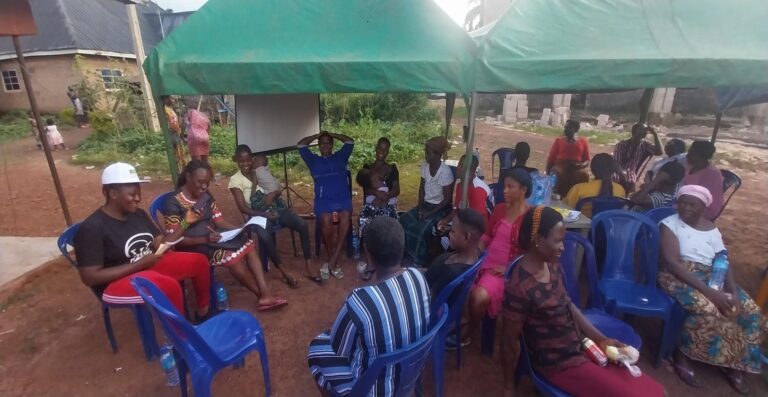The writing from this series emerged from a “writeshop” organized by Gender at Work and Ladysmith as part of the “Artificial Intelligence for Development Africa,” also known as AI4D, financed by the International Development Research Centre (IDRC) and the Swedish International Development Cooperation Agency (SIDA). This was part of the final on-line Peer Learning Journeys (PLJ) workshop, modeled on Gender Action Learning (GAL), held in May, 2024.
The Past: Where was I then?
Prior to joining the AI4AFS project, I had worked with a different organization in the agricultural sector where we focused on providing tech solutions to farmers. I must admit that integrating gender equality and inclusion (GEI) was not a primary consideration. Our focus was mainly on developing cutting-edge technology solutions to address challenges in the agriculture value chain. We were excited about the potential of AI and tech to revolutionize farming practices and improve productivity.
However, as I joined AI4AFS to delve deeper into the project, I realized that our approach at the previous organization was inherently biased towards men and the privileged segments of farming communities.
During the initial stages of stakeholder engagement, reality hit me. During the PLJs and AI4AFS discussions on the adoption of digital tools by farmers, men were often the first groups to want to see and adopt the new technology. In my past engagements with farmers in my previous organization, I had witnessed how men had louder voices at farmer group meetings and during decision making on accepting new digital tools compared to their counterparts. I held the perception that women farmers and marginalized people are not early adopters of digital tools and may not be interested in deploying these tools in their farming activities.
But during this Gender Equality and Social Inclusion project in AI4AFS, I encountered stories of women farmers and marginalized people who expressed interest in the use of technology to improve their farming practices and its management. This contradicted my expectation that men might warm up to tech solutions before their women counterparts. It became evident to me that AI and tech solutions, no matter how advanced, would further exacerbate the existing inequalities if we did not intentionally design them with inclusivity in mind.
The turning point for me was when we conducted community dialogues in Nigeria. Listening to the voices of women farmers and their unique challenges was a humbling experience. It made me realize that we, as researchers, had been operating in a bubble, sometimes unaware of the complexities and nuances faced by those we aimed to serve.

The Present: Where am I now?
The journey of integrating GEI in our research has been transformative. We made a conscious shift towards a “design-by-inclusion” approach, actively involving women and marginalized communities throughout the entire process — from needs identification to solution conception, design, and development.
One of the most significant learnings for me has been the importance of co-creation. Collaborating closely with our stakeholders, we gained invaluable insights into their lived experiences, priorities, and perspectives. Our collaboration not only ensured that our AI solutions were tailored to their specific needs, such as real-time disease detection in crops, one of the top priority needs of our stakeholders. Co-creation also fostered a sense of ownership and trust among the communities we worked with.
As a hub, we have grown tremendously in our understanding of the intersectionality of gender, disability, age, and other factors that contribute to marginalization. We have learned to challenge our own biases and assumptions, and to embrace diverse perspectives in our research and development processes. Collectively, we have witnessed the transformative power of inclusive design. By giving women and marginalized communities a voice and a seat at the table, we have not only created more relevant and impactful AI solutions but also empowered these communities to become active participants in their own development.
The Future: Where am I going?
Moving forward, I am committed to ensuring that GEI remains a core principle in all my research endeavors. The lessons learned from the AI4AFS project have highlighted the importance of an intersectional and inclusive approach in creating truly sustainable and equitable solutions.
One of my goals is to scale up the “design-by-inclusion” methodology across my research portfolio. This will involve developing comprehensive guidelines and training programs for my team members, encouraging them to adopt a more participatory and co-creative approach from the outset.
Additionally, I envision fostering stronger collaborations with local organizations, community leaders, and policymakers to ensure that our research aligns with the broader goals of promoting gender equality and social inclusion.
Ultimately, my vision is to create a research team where diverse voices are not only heard but actively shape the direction and outcomes of our work. By embracing GEI as a fundamental value, we can harness the full potential of AI to create a more just, equitable, and sustainable future for all.
Sam Rex Sagoe Babo is a Managing Director and a Research Lead at Kumasi Hive, Ghana. His research is related to Gig Economy, Circular Economy, and Gender, Equality and Inclusion in Artificial Intelligence. You can find him on LinkedIn, X (Twitter), and Instagram.
